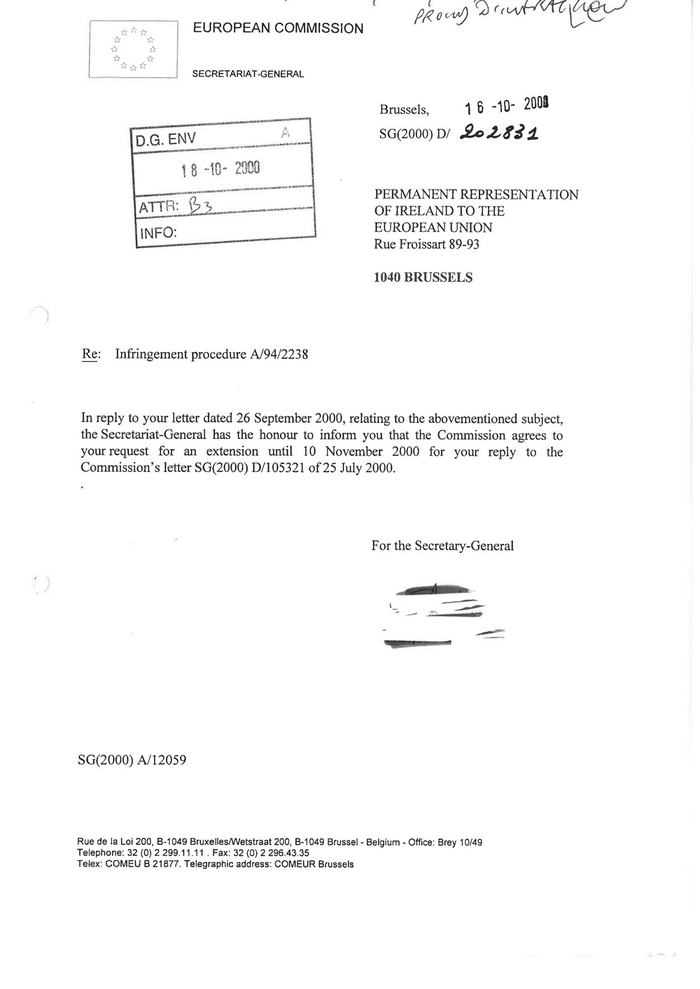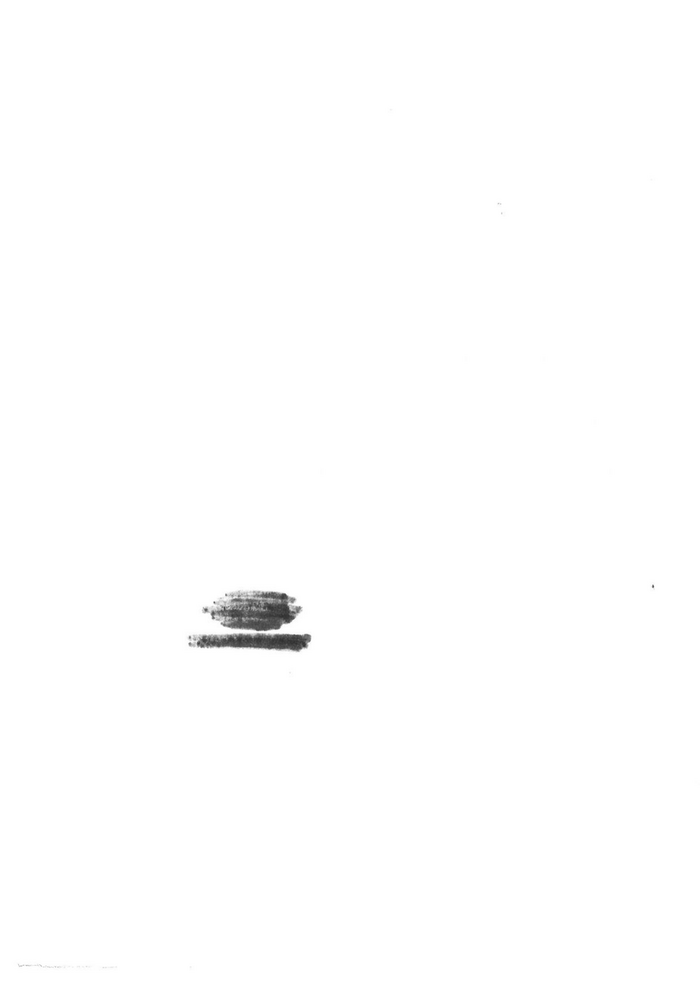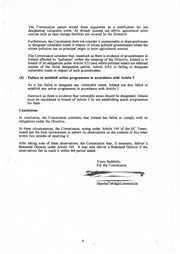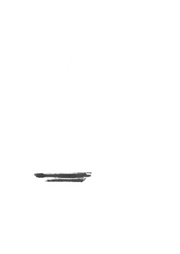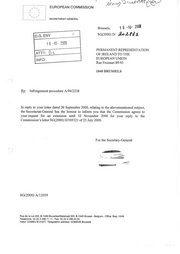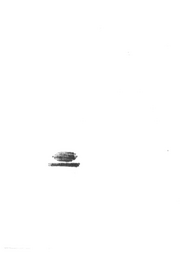94-2238-lfn-1-25-10-1996
Dieses Dokument ist Teil der Anfrage „Infringement proceedings 1990-1994“
077777772 Fr COMMISSION EUROPEENNE or) % or eo 8 Dub HMocr Be SECRETARIAT GENERAL FT mem Bruxelesle 25 octobre 1996 N? SG(96) D/9192 Iwnro: DAN INFRACTION / IRLANDE (94/2238) Directive 91/676/CEE - Protection des eaux contre la pollution causee par les nitrates d'origine agricole Lettre de mise en demeure compl&mentaire notifiee le 21 octobre 1996 Document diffuse a la Commission pour information. Decision d’envoi de la lettre de mise en demeure compl&mentaire, au titre de l’article 169 CE, prise par la Commission le 26 juin 1996 (cf. COM(96) PV 1299). ..——nsnnnhnnnhhhnnnnainnn nn annnennnmmnnnanonnennnnnnunnnn Destinataires : les Membres de la Cömmission —_ Ti) nun

Sir,
+4
44
wir EUROPEAN COMMISSION
Nr%
Brussels, 21 -10- 1996
SG(96) D/ 9 1 9 2
94/2238
I would like to draw your attention to the implementation by Ireland of
Directive 91/676/EEC concerning the ‚protection of waters against pollution caused by
nitrates from agricultural sources ("the Directive").
The Commission would contend that Ireland is not in conformity with its obligations
under the Directive in the following respects.
()
Non-conformity of Irish transposing legislation
Article 12 of the Directive requires Member States to bring into force the laws,
regulations and administrative provisions necessary to comply with the Directive
by 19 December 1993. When adopted or on the occasion of their official
publication, these measures are required to contain a reference to the Directive.
Member States are also required to communicate the texts of the provisions of
national law which they adopt in the field covered by the Directive.
The Commission considers that, contrary to Article 12, Ireland's transposing
legislation does not constitute an adequate transposition of the Directive.
By letter of 17 July 1995, the Irish authorities referred the Commission to its
* Local Government (Water Pollution) Acts, 1977 and 1990 ("the Water
Pollution Acts") as providing the statutory basis for the Directive's implementation
in Ireland.
His Excellenrv
— Ba aenı
‚anaiste and nn
Minister for Foreign Affairs
St Stephen's Green, 80
IRL - DUBLIN 2
Rue de la Lei 200, B-1049 Bruxelles/Wetstraat 200, B-1049 Brussel - Belgium - Office:
Telephone: direct line (+32-2)29......., exchange 299.11.11. Fax: 29.......
Telex: COMEU B 21877. Telegraphic address: COMEUR Brussels.

As regards. the designation of vulnerable zones and the establishment of action programmes (Articles 3 and 5 of the Directive), the Irish authorities referred the Commission to Section 21 of the Local Government (Water Pollution Act), 1990, stating that this provides for the introduction of comprehensive controls on all aspects of agriculture which could entail a risk of water pollution, as well as the prohibition or regulation of specified activities in relation to specified lands. In relation to action programmes, the Irish authorities also referred the Commission to Section 12 of the Local Government (Water Pollution Act) 1977. In relation to monitoring under the Directive (Article 5(6) and 6 of the Directive), they referred the Commission to Section 22 of the Local Government (Water Pollution Act), 1977. Article 3 Article 3(1) imposes an obligation on Member States to identify certain waters in accordance with the criteria set out in Annex I of the Directive. Section 21 imposes no such obligation on the Irish Minister for the Environment or Irish local authorities (who are given powers to introduce restrictions on agriculture in areas to be specified). Nor is any reference made to the criteria in Annex I. Article 3(2) imposes an obligation on Member States, by 19 December 1993, to designate as vulnerable zones all known areas of land in their territories which drain into the waters identified according to Article 3(1) and which contribute to pollution. Article 3(4) requires Member States to review the designation of vulnerable zones, making additional designations if necessary. Article 3(5) exempts Member States from the obligation to identify specific vulnerable zones if they era and apply throughout their territory action programmes referred to in Article 5 Section 21 imposes no obligation to designate or review the designation of vulnerable zones. Nor does it create the alternative obligation to apply an action programme throughout Ireland. Section 21 cannot therefore be considered an adequate transposition of Article 3. Article 5 Article 5 of the Directive relates to action programmes which must be applied to the vulnerable zones designated under Article 3 of the Directive. Article 5(1) requires Member States to establish action programmes in accordance with a specified timetable. Article 5(3) requires action programmes to take into account available scientific and technical data and environmental conditions. Article 5(4) imposes a four-year implementation deadline for action programmes and stipulates certain mandatory measures. Article 5(5) requires Member States, where necessary, to take additional measures within the framework of action programmes. Article 5(6) requires Member States to draw up and implement suitable monitoring programmes to assess the effectiveness of action programmes. Article 5(7) requires Member States to review and if necessary revise action programmes at least every four years. Sara? \

While Section 21 gives. the Irish Minister for the Environment and Irish local authorities powers to take certain actions in relation to agricultural activities, these powers are not referable to the timetable or obligation of Article 5(1). Furthermore, the actions are not specifically required to take account of scientific and technical data and environmental conditions, nor are they subject to implementation deadlines or monitoring programmes. There is no obligation to review and revise them in accordance with Article 5(7). Section 21 cannot therefore be considered an adequate transposition of Article 5. Section 12 empowers local authorities to require persons to take measures to prevent water pollution. However, there is no obligation on local authorities to invoke Article 12, nor is there any reference to the timetable set out in Article 5(1). Furthermore, in exercising their power under Article 12, local authorities are not specifically required to take account of scientific and technical data and environmental conditions, nor are they subject to implementation deadlines or monitoring programmes. There is no obligation to review and revise action taken under Section 12 in accordance with Article 5(7). Section 12 cannot therefore be considered an adequate transposition of Article 5. Section 22 requires local authorities or sanitary authorities to carry out such monitoring as they may be directed to do by the Irtsh Minister for the Environment. However, Section 22 does not impose any obligation on the Irish Minister for the Environment to make directions in relation to action programmes, and the Minister has not made any directions to date. Section 22 cannot therefore be considered an adequate transposition of Article 5(6). Article 6 For the purposes of designating and revising the designation of vulnerable zones, Article 6 requires Member States to carry out monitoring of nitrate concentrations and to review the eutrophic state of fresh surface waters, esturial and coastal waters, according to specified timetables. As.noted above, Section 22 requires local authorities or sanitary authorities to carry out such monitoring as they may be directed to do by the Irish Minister for the Environment. However, Section 22 does not impose any obligation on the Minister to make directions in the terms of Article 6. The Irish authorities informed the Commission in a letter of 14 December 1993 that in October 1992 all relevant local authorities (33 in number) had been directed by the Minister for the Environment to undertake an initial monitoring programme over a one-year period so as to facilitate the designation of vulnerable zones by the deadline set in the Directive. Detailed instructions to local authorities were set out in Circular WP 7/92 (a copy of which was communicated with the said letter of 14 December 1993). In content, Circular WP 7/92 was unsatisfactory for reasons explained in part (2) below. The deficiencies in the Circular illustrate the consequences of the Minister not being bound by the Irish legislation to make directions in the terms of Article 6. Section 22 cannot therefore be considered an adequate transposition of Article 6.

(2)
Article 12(2)
It may be noted that the Water Pollution Acts contain no reference to the Directive
in accordance with Article 12(2).
Failure to monitor correctly in accordance with Article 6
In their letter of 17 July 1995, the Irish authorities explained in detail how they
undertook monitoring for the purpose of the first monitoring period under Article 6
(under Article 6(1) this period was required to last for one year during the interval
between 19 December 1991 and 19 December 1993).
Monitoring was assigned as a task to Irish local authorities on the direction of the
Irish Minister for the Environment, with the abovementioned Circular WP 7/92
("the Circular") containing detailed instructions on how monitoring should be
carried out.
The Circular and its Appendix indicated to local authorities that nitrate
contamination arising from agricultural point sources fell outside the scope of the
intended monitoring exercise and apparently of Ireland's implementation of
the Directive.
In particular, paragraph 1.3 of the Appendix states: "Unless there is definite
evidence that the source of the nitrate is due to domestic or municipal sewage,
or defective storage facilities for farmyard manures, slurry or effluent, or industrial
discharges, it should be assumed that the cause is of diffuse agricultural origin.
If evidence that the nitrate is non-agricultural or from a point source becomes
available, then monitoring of such waters for the purpose of (the) Directive can
cease. The Department should be notified of such cases." (emphasis added)
Paragraph 3.3 of the Appendix states: "Results of analyses from boreholes, wells or
Springs supplying water 10 small numbers of domestic dwellings may not be reliable
as they can be unrepresentative of general aquifer quality or be subject to localised
contamination by septic tanks or stored farmyard wastes. In general, individual
supplies serving populations of less than 500 should be given a low priority for
monitoring. However, where a significant number of single-dwelling supplies in an
area indicate the presence of elevated nitrates, then a representative sampling
regime for the aquifer concerned should be established outside_the_influence_of
point source pollution." (emphasis added)
These instructions to local authorities to restrict or limit the scope of monitoring in
relation to point agricultural sources (in particular, farmyard storage facilities) and
small drinking water supplies are not justified by reference to Article 6.
In particular, Directive 91/676/EEC encompasses agricultural point sources. They
are explicitly mentioned in Annex II A 5, and Annex II 1.2, and the definition of
"pollution" in Article 2 of the Directive relates to all agricultural sources.
Furthermore, so far as groundwater monitoring is concerned, Article 6 does not
permit monitoring to be circumscribed on the basis that an affected aquifer serves
a particular level of human population.
In the light of the absence of a correct statutory basis for monitoring as well as the
deficient instructions given to local authorities, the Commission considers that
Ireland failed to properly carry out its monitoring obligations under Article 6.

(3) Failure to identify waters and to designate vulnerable zones in accordance with Article 3 A Failure to identify waters In their letter ‘of 17 July 1995, the Irish authorities referred to a number of groundwater drinking water sources (68) which had nitrate readings greater than 40mg/l NO3. Official Irish drinking water reports covering the period 1991 to 1993 confirm the existence of certain groundwaters containing nitrate levels in excess of 50mg/l. Such groundwaters were usually linked to small rural drinking water supplies, and must reasonably be considered as being potentially exposed to agricultural sources of nitrate. The Commission would observe that, given the deficient instructions to local authorities in the Circular, there may be additional waters in Ireland affected by "pollution" as defined in Article 1 which have not been detected. In their letter of 17 July 1995, the Irish authorities attributed high groundwater nitrate levels generally to "bad housekeeping practices". Incorrectly sited silage and slurry pits were mentioned as examples. These are "agricultural sources" for the purposes of the definition of "pollution" given in the Directive. From the foregoing, the Commission concludes that there are Irish groundwaters affected by pollution or which could be affected by pollution if action pursuant to Article 5 is not taken. It considers that the Irish authorities were not justified in contending in their letter of 17 July 1995 that "no waters coming within Article 3(1) of the Directive have been identified". In failing to formally identify waters coming within Article 3(1), Ireland is in breach of that Article. Failure to designate vulnerable zones Ireland has not established and applied action programmes throughout its territory, as it is entitled to do under Article 3(5) of the Directive. Therefore, the exemption given in Article 3(5) from the obligation to identify specific vulnerable zones does not arise. However, Ireland has not designated any vulnerable zones in accordance with Article 3(3) and/or 3(4). The lack of designation of vulnerable zones is a consequence of the failure to identify waters under Article 3(1) of the Directive. In their letter of 17 July 1995, the Irish authorities state that they are satisfied that no waters coming within Article 3(1) ofthe Directive have been identified and, "in these circumstances, the designation of vulnerable zones does not arise at this time." At package meetings held on 10 July 1995 and 17 October 1995 between Commission and Irish officials, Ireland argued in favour of an interpretation of the Directive which would exclude from its scope pollution from point agricultural sources. It also argued that it would be unreasonable and disproportionate to designate vulnerable zones simply on the basis of defective farm storage facilities.

(4 The Commission cannot accept these arguments as a justification for not designating vulnerable zones. As already pointed out above, agricultural point sources such as farm storage facilities are covered by the Directive. Furthermore, the Commission does not consider it unreasonable or disproportionate to designate vulnerable zones in respect of nitrate polluted groundwaters where the nitrate pollution has its principal origin in point agricultural sources. The Commission considers that, inasmuch as there is evidence of groundwaters in Ireland affected by "pollution" within the meaning of the Directive, Ireland is in breach of its obligations under Article 3(3) (and where polluted waters are detected outside of the initial designation period, Article 3(4)) in failing to designate vulnerable zones in respect of such groundwaters. Failure to establish action programmes in accordance with Article 5 As it has failed to designate any vulnerable zones, Ireland has also failed to establish any action programmes in accordance with Article 5. Inasmuch as there is evidence that vulnerable zones should be designated, Ireland must be considered ın breach of Article 5 by not establishing action programmes for them. Conclusions In conclusion, the Commission considers that Ireland has failed to comply with its obligations under the Directive. In these circumstances, the Commission, acting under Article 169 of the EC Treaty, would ask the Irish Government to submit its observations on the contents of this letter within two months of receiving it. After taking note of these observations, the Commission may, if necessary, deliver a Reasoned Opinion under Article 169. It may also deliver a Reasoned Opinion if the observations fail to reach it within the period stated. Yours faithfully, For the Commission Member DEIh Commi=ion

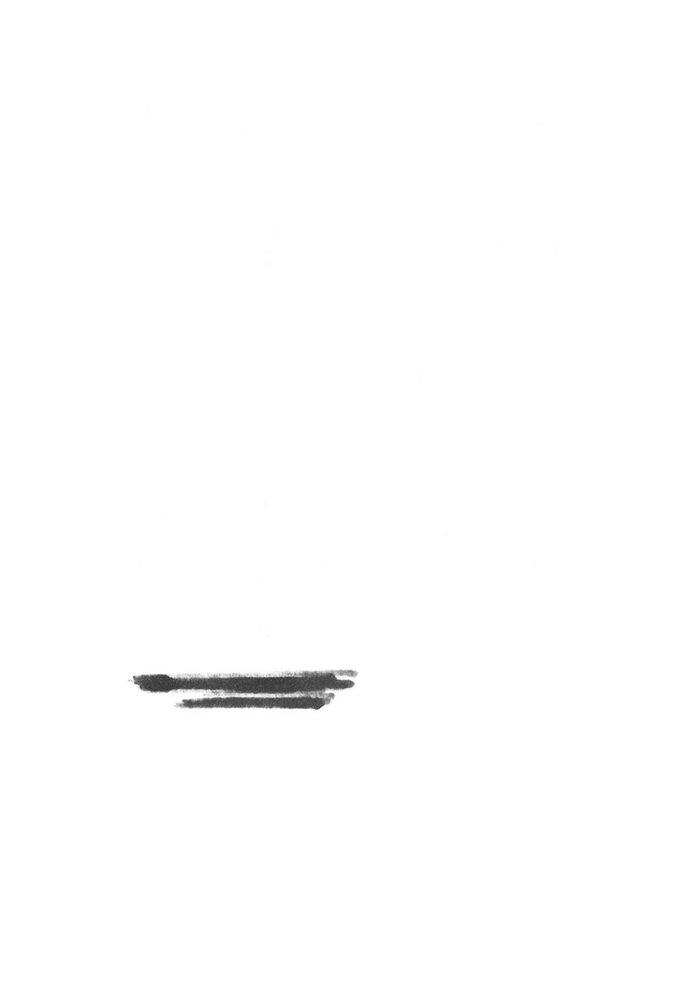
PRow) 2 a I AR
»# | EUROPEAN COMMISSION
| SECRETARIAT-GENERAL
z Brussels, 46 -10- 2008
5 J SG(2000)D) 202834
18 -10- 2900
ATTR: 6%
urn menu
PERMANENT REPRESENTATION
OF IRELAND TO THE
EUROPEAN UNION
Rue Froissart 89-93
nennen
nn ee
1040 BRUSSELS
Re: Infringement procedure A/94/2238
In reply to your letter dated 26 September 2000, relating to the abovementioned subject,
the Secretariat-General has the honour to inform you that the Commission agrees to
your request for an extension until 10 November 2000 for your reply to the
Commission’s letter SG(2000) D/105321 of 25 July 2000.
For the Secretary-General
SG(2000) A/12059
Rue de la Loi 200, B-1049 Bruxelles/Wetstraat 200, B-1049 Brussel - Belgium - Office: Brey 10/49
Telephone: 32 (0) 2 299.11.11 . Fax: 32 (0) 2 296.43.35
Telex: COMEU B 21877. Telegraphic address: COMEUR Brussels
